Free online math programs are fantastic ways for middle school students to get extra practice without feeling like they’re doing extra homework. Unlike paper assignments, computer games are interactive and have exciting graphics and sound effects that are automatically more interesting to kids than numbers on a sheet of paper – even if the game revolves around math. In other words, learning games let kids have fun and sharpen their math skills at the same time.
If you’ve looked at all, you know there are a lot more than 15 free online math programs out there. These 15 games were chosen specifically to target areas that many middle school students need to work on: fractions, ratios, proportions, decimals, percentages, factors, integers, geometry, and order of operations.
That said, not all of these programs are the same type of game. They can be split into logic puzzles, speed games, and multi-player games. If your child is generally bored by math and unmotivated to do homework, I’d recommend skipping ahead to the speed games: they’re the most game-like and the best bet for tricking a middle school student into practicing math.
Free Online Logic Puzzle Programs
Logic puzzles are great for students who like brainteasers and don’t need a lot of bells and whistles to consider a game fun. If your child likes puzzles like Sudoku, then this is the section for you.
1.Triplets & Decention: Fractions, Decimals, & Percentages
Triplets and Decention are two different versions of the same game. In this game, the player sorts equivalent numbers and graphs. For example: ½, 50%, and 0.5 would all be sorted into the same area. Triplets focuses on equivalent fractions, and Decention adds in equivalent decimals and percentages.

2.Party Designer: Area & Perimeter
In Party Designer, you have to lay out the space for each activity planned for the party. You’re given the activities (cake table, seesaw, clown area, etc.) and their corresponding area and perimeter. If you can make them the right size without overlapping, you win!

3. Reflect & Rotate: Geometric Transformations
Kids often have trouble picturing reflections and rotations, but they won’t after they play this game for a while. With each puzzle, players get a set of instructions (i.e., flip horizontally). Then, they click on the boxes to light up the resulting image. Get it right, and they can move on. If not, well: “if at first you don’t succeed, try, try again.”
4. Integer Conundrum & Decimal Conundrum
This is another math game that has two versions. In one game, you practice integer addition; in the other, decimal addition. It’s a mix of math and process of elimination (kind of like Sudoku).

5. Number Quest: Integers
This is a little like 20 questions for integers. Players get a list of questions that they can choose to ask to help them guess the mystery integer. This not only tests a student’s knowledge of integers but also sharpens strategy and critical thinking. And as brain challenges go, it’s pretty fun!

6. Operations Game: PEMDAS (Order of Operations)
If you’ve ever played 24, Operations Game works the same way: figure out what operations are needed to make the given numbers equal to 24. The only difference is that in this game, you’ll get a different number to try to make each time (it won’t always be 24).
I’ve occasionally played a similar game on the board with my MathWizard students, and honestly, the students love it (from Pre-Algebra I up to Geometry).
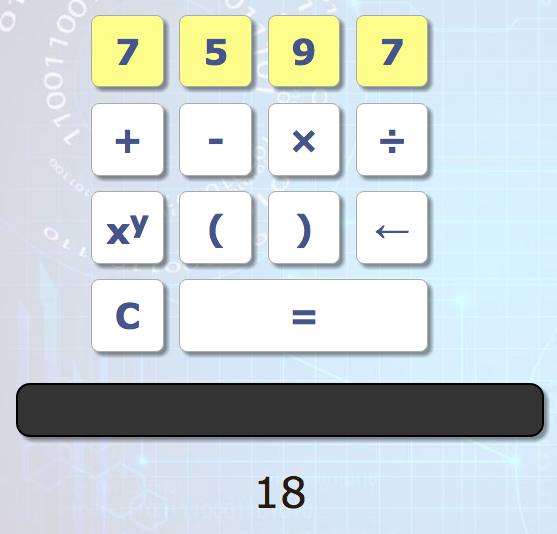
Free Online Speed Games for Math
The most basic form of a speed game rates the player solely on how fast they can do the math. These are often racing games where whoever calculates the fastest wins. Some students will be perfectly happy with that, and others won’t consider it a game at all (that’s just a time-test with pretty pictures!).
Speed games become more game-like when they add elements like aiming, timing, and moving a figure. The following free programs not only test speed and math skills, but they also involve more interaction on the player’s part. If you’re looking for speed-only games, check out the multi-player games in the next section.
7. Mathman: PEMDAS (Order of Operations)
If you want a more fast-paced, interactive PEMDAS practice, try Mathman. This is basically a new take on Pac Man. You’ll need to guide mathman to a question, solve it, and then eat the ghost with the answer. Don’t eat the wrong ghost – or get eaten by one! The ghosts are moving the entire time, so this game requires some multi-tasking and strategy on top of the math.
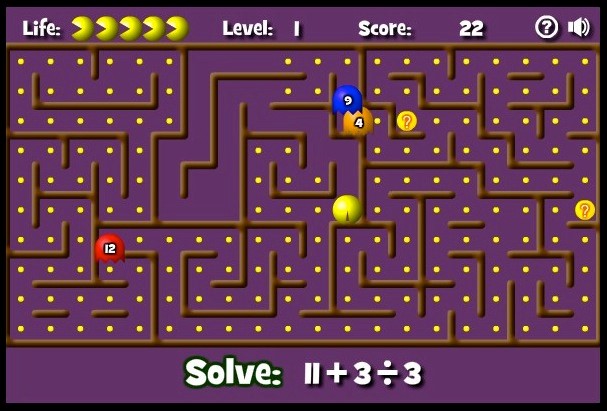
8. Pumpkin Multiples: Factors
In this game, the goal is to move the ghost so that it catches all the factors of a specific number – and only the factors of that number. If the number is 3, and you catch a 5, that’ll count against your score. So will missing 36 and letting it fall to the ground instead of catching it. That means you’ll need fast reflexes, a solid knowledge of the factors, and good coordination.
The best part of the game is that you can pick the number at the beginning (out of 2-12), which lets students focus on numbers that they don’t know as well and still have variety. This game is good practice for LCM, GCF, and prime factorization. Students with a strong knowledge of factors are also better prepared for algebra.
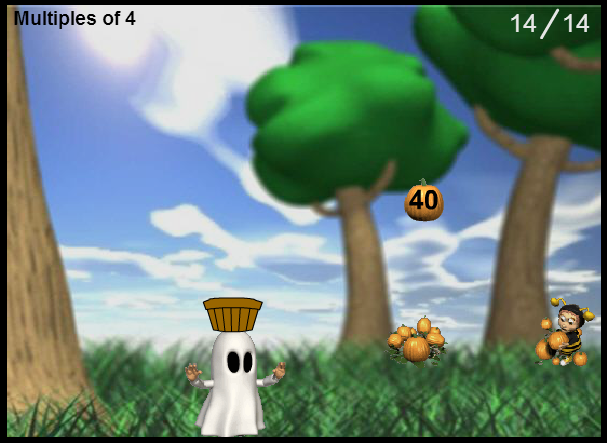
9. Ratio Martian: Ratios
Feed the hungry ratio Martian! This game is a ratio recognition game. It can help students recognize ratios in words, with a colon, and in a fraction. A timing element makes it a bit more of a challenge (and more of a game).
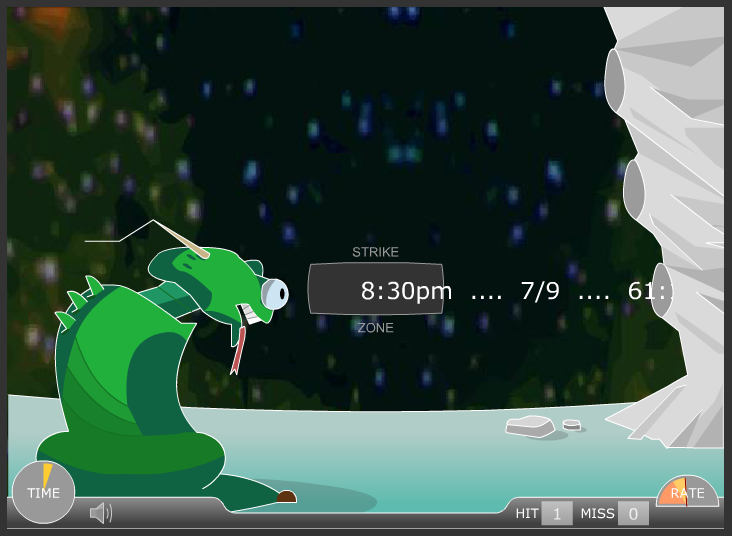
10. Ratio Blaster: Ratios
Practice equivalent ratios by blasting asteroids out of the sky! Not only is this good practice for matching equivalent fractions to a ratio written in a different form (for example, 2 to 4), but it also requires timing and coordination.
Free Online Math Games for Multiple Players
Most of these free math games are basic speed games, but for students motivated by competition, these games allow them to test their math skills not only against the computer but also against other students around the world (that’s what’s great about playing online!). Some of the programs even allow students to play on teams. With some planning, students could play against their friends from school or team up with their friends to take on everyone else!
11. Dirt Bike Comparing Fractions
This game is set up as a tug-of-war using dirt bikes. The two teams square off, and the speed and accuracy of the answers decides which teams pulls farther and faster. To help their team, students must pick whether the given fractions are <, =, or >.
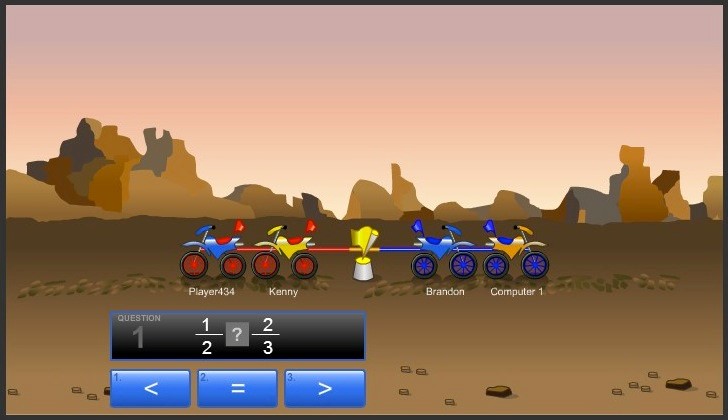
Rather than picking the symbol in this game, students pick the number that makes the proportion true. The student that answers the fastest and the most accurately wins the race and can play against the computer or against other students online.

13. Puppy Chase: Converting Fractions to Decimals
This is another speed race. This time students win by picking the decimal that is equal to the fraction provided.
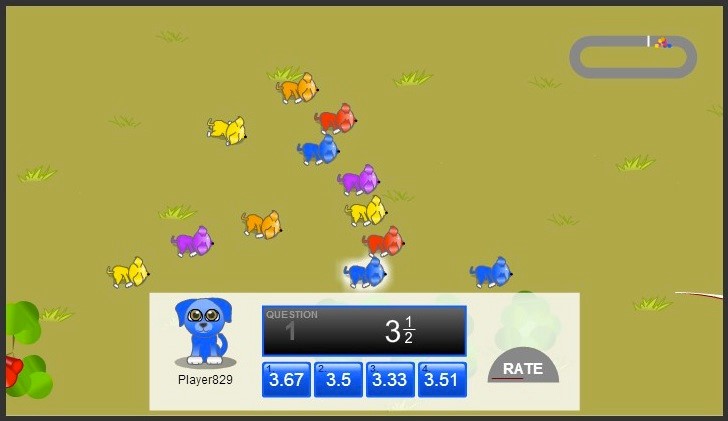
14. Puppy Pull: Converting Words to Decimals
Like #11, this is tug-of-war, and students can play on teams or against the computer if no one else is online. To play, they must pick the decimal that is equal to the words provided (1.5 for “one and one half”), so this is a wise choice for students who struggle with word problems.

15. Area Blocks: Area & Perimeter
Unlike the other multi-player math programs on this list, this is not a speed game. Instead, students have to use strategy and an understanding of area and perimeter to fill as much of the game board as possible. You can play against the computer or against a friend. The two opponents take turns trying to make a figure with the area and perimeter given. After twelve rounds, the player who filled up the most area in that time is the winner.
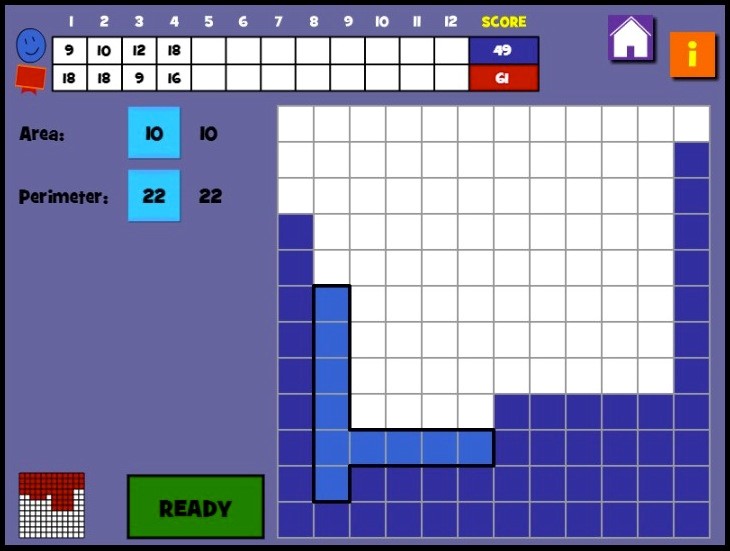
Well, that’s it! 15 free online math programs that focus on math topics for middle school students (including some games with multiple variations). If you want more, each of these sites has plenty of games for math practice. Some of them are better learning tools than others, so we recommend starting with these 15.
What do you think – can these games trick your middle school student into doing math? What’s your favorite?
Author: Elizabeth F., Writer and Teacher at MathWizard, Inc.
